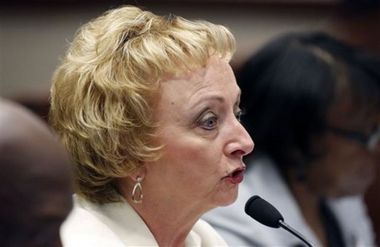

CLINTON, Miss. (AP) — Mississippi officials say they’re trying to measure whether struggling school districts are getting good results from contractors hired to help teachers and students.
In a presentation Thursday to the State Board of Education, Office of School Improvement Director Jamilliah Longino said the state has begun meeting quarterly with contractors to 26 school districts that have low-performing schools targeted for extra state help.
“We have noticed that at times, the money that was expended is not necessarily giving us the results we’d like,” said state Superintendent Carey Wright. “We’re going to hold their feet to the fire a little closer.”
The idea is to find out what goals contractors are setting and measure whether they and districts are achieving those goals. Some state board members and others have long questioned whether districts are getting good value for contractors, who are often paid with federal money that goes to aid impoverished students.
“I think everyone’s concerned about measurement,” said state school board member Bill Jones of Petal. “Can we measure what those people are doing?”
Many smaller districts depend on vendors to help teachers improve instruction because they don’t have anyone on staff who can do that.
“They’ve been an important source because of the capacity-building aspect for the teachers in our school district,” said James Johnson-Waldington, the superintendent of the West Bolivar school district. His district is among the 26 targeted for extra help.
School districts aren’t required to advertise for proposals when hiring people to provide services. State officials said some do and some don’t. That has raised concerns about favoritism and even corruption. Greenville Superintendent Harvey Franklin was convicted in 2012 of taking $270,000 in bribes from a Georgia vendor to influence the school board to spend $1.4 million on a reading program for children. Both Franklin and the vendor — Edna Goble of Conyers, Georgia — are serving federal prison sentences.
Johnson-Waldington said that when he first became superintendent in Hollandale, vendors would appear unannounced to pitch him on their services. Later, he worked for a time for the Bailey Educational Group, a Ridgeland-based company that provides many such services. Now, Johnson-Waldington said he hires companies to get access to individuals he has found effective in the past.
Though local school districts make decisions about vendors, the state has leverage because it oversees how districts spend federal money. Wright said she was confident that local superintendents wouldn’t keep contracting with vendors that the state found were ineffective.
“That would be like burning money,” she said.



